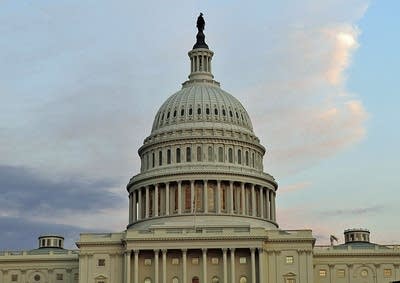How Minnesota might be affected by a ban on earmarks

If congressional Republicans have their way, the practice of earmarks will soon become a thing of the past.
There has been a lot of talk about earmarks over the past several years with critics complaining the spending for pet projects wastes taxpayer money.
Like every other state Minnesota has a lot of projects that were funded with earmarks. And, many had bipartisan support from members of Minnesota's congressional delegation.
From roads and bridges, to rail lines and research projects -- even the Minnesota National Guard's popular "Beyond the Yellow Ribbon" soldier reintegration program -- Minnesota has benefited from more than a $500 million in earmark spending in just the last couple of years.
Create a More Connected Minnesota
MPR News is your trusted resource for the news you need. With your support, MPR News brings accessible, courageous journalism and authentic conversation to everyone - free of paywalls and barriers. Your gift makes a difference.
Washington University Political Science Professor Steven Smith says many lawmakers like earmarks.
If you've got enough power in Congress you can use earmarks to circumvent government red tape to direct money to projects, you, and sometimes you alone, think need money.
Smith said a transportation bill is a typical place you might see earmarks.
"In a roads and bridges bill it might indicate that a certain freeway interchange will receive $300 million rather than allowing the Department of Transportation to determine those priorities under its usual decision making process," he said.
Earmarks brought millions to Minnesota in 2010. For example:
DFL Rep. Collin Peterson got more than $7 million for flood control projects in his northwestern Minnesota district;
DFL Rep. Jim Oberstar secured $15 million for jet fuel storage in his district at the Duluth airport;
And Republican Rep. Erik Paulson brought home more than $1.5 million for road projects in his suburban district.
Even though total earmark spending amounts to just a small percentage of the federal budget, some voters don't like the practice. Criticism of the growing use of earmarks for pet projects led Congress to pass a law in 2007 requiring lawmakers' names be attached to their earmarks.
Smith says allowing some lawmakers to essentially dodge normal spending protocol with earmarks is generally not good public policy because it bypasses federal agencies planning and procedures.
"They have technical criteria that they apply and, in many cases, especially in the scientific areas there are peer review processes that determine spending priorities," Smith said. "Earmarks supplant all of those decision making processes and force an allocation of resources that's contrary to whatever those policy principles are."
While most of the focus of earmarks is on spending, earmarks are also used on the tax collection side to target certain companies or industries for special treatment.
Oberstar, who just lost his reelection bid, chairs the House Transportation Committee. He has sponsored more earmarks than any other member of Minnesota's delegation -- hardly a surprise given Oberstar's more than 30 years in Congress.
But Oberstar is on his way out, and DFLer Rep. Peterson is losing his chairmanship of the powerful House Agriculture Committee.
University of Minnesota Political Science Professor Larry Jacobs said given that power shift, Minnesota wouldn't be in line for as many earmarks as in years past even if the practice were to continue. Still, the the earmark ban probably won't hurt Minnesota as much as other states, Jacobs said.
"Particularly in the South where they've been very strategic in getting their members and using their positions to bring bacon back home," he said. "One of the ironies here is that some of the members who are going to be losing money are very senior Republican Senators and members of the House."
The Republican takeover of the House of Representatives does leave Minnesota 2nd District Republican Rep. John Kline in line to chair the House Education committee.
But even if earmarks somehow survive, don't expect Kline to use his clout to shower Minnesota with loads of targeted education spending. Kline is the only member of the Minnesota delegation who has refused to sponsor any earmarks.
